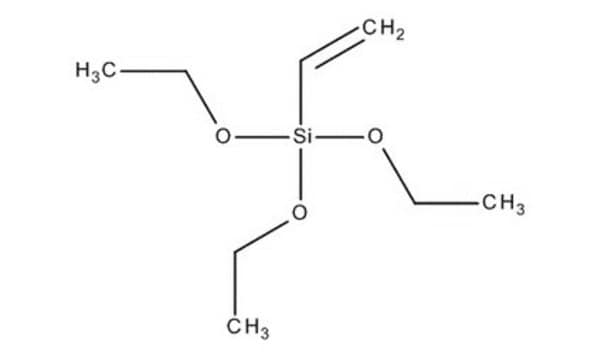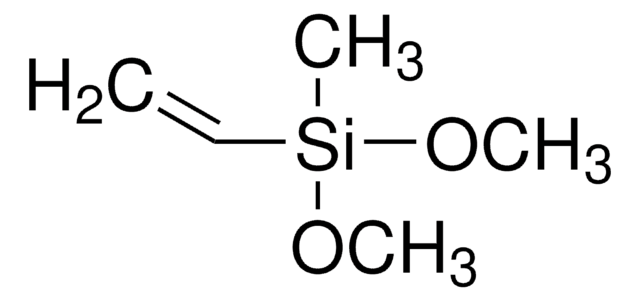679275
Triethoxyvinylsilane
≥98%, deposition grade
Synonym(s):
(Triethoxysilyl)ethylene, Vinyltriethoxysilane
About This Item
Recommended Products
grade
deposition grade
Quality Level
Assay
≥98%
form
liquid
refractive index
n20/D 1.398 (lit.)
bp
160-161 °C (lit.)
62-63 °C/20 mmHg (lit.)
density
0.903 g/mL at 25 °C (lit.)
SMILES string
CCO[Si](OCC)(OCC)C=C
InChI
1S/C8H18O3Si/c1-5-9-12(8-4,10-6-2)11-7-3/h8H,4-7H2,1-3H3
InChI key
FWDBOZPQNFPOLF-UHFFFAOYSA-N
Looking for similar products? Visit Product Comparison Guide
Signal Word
Warning
Hazard Statements
Precautionary Statements
Hazard Classifications
Eye Irrit. 2 - Flam. Liq. 3 - STOT SE 3
Target Organs
Respiratory system
Storage Class Code
3 - Flammable liquids
WGK
WGK 1
Flash Point(F)
93.2 °F - closed cup
Flash Point(C)
34 °C - closed cup
Personal Protective Equipment
Choose from one of the most recent versions:
Already Own This Product?
Find documentation for the products that you have recently purchased in the Document Library.
Customers Also Viewed
Articles
Deposition Grade Silanes, fully characterized by chemical analysis and nuclear magnetic resonance (NMR) with greater than 98% purity, for Sol-Gel Processes.
Mesoporous materials, such as aerogels, offer advantages for practical hydrogen storage. They have large surface areas, open porosity, small pore sizes, and the ability to coat the surface with one or more compounds.
Mesoporous materials, such as aerogels, offer advantages for practical hydrogen storage. They have large surface areas, open porosity, small pore sizes, and the ability to coat the surface with one or more compounds.
Mesoporous materials, such as aerogels, offer advantages for practical hydrogen storage. They have large surface areas, open porosity, small pore sizes, and the ability to coat the surface with one or more compounds.
Our team of scientists has experience in all areas of research including Life Science, Material Science, Chemical Synthesis, Chromatography, Analytical and many others.
Contact Technical Service











